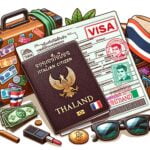Italy has implemented a vaccine requirement for travelers, and it is crucial to understand the details before planning a trip. This article aims to provide comprehensive information on the vaccine requirement for traveling to Italy. It will explain the current situation and emphasize the significance of being fully vaccinated. By adhering to these guidelines, travelers can ensure public health while enjoying their trip to this beautiful country.
Italy, like many other countries, has implemented a vaccine requirement for entry in response to the ongoing COVID-19 pandemic. The Italian government has set specific guidelines regarding vaccines that are recognized and accepted for travel purposes. It is essential for travelers to be aware of these requirements and comply with them before embarking on their journey.
Being fully vaccinated not only protects individuals but also contributes to overall public health by reducing the risk of spreading the virus. Therefore, travelers planning a trip to Italy must prioritize getting vaccinated and fulfilling all necessary vaccination doses as per the guidelines provided by health authorities.
In the following sections of this article, we will delve into further details regarding Italy’s entry guidelines, vaccine verification process, traveler experiences, accommodations and activities selection based on vaccine requirements, traveling with children, staying informed about updates related to the vaccine requirement, and making the most of your trip while prioritizing public health. With this comprehensive understanding of Italy’s vaccine requirement, travelers can plan their trip confidently and responsibly.
Vaccine Requirement
Italy has implemented specific vaccine requirements for travelers entering the country. It is important for anyone planning a trip to Italy to understand these guidelines in order to ensure a smooth and successful visit. The Italian government has set certain criteria regarding approved vaccines and dosage requirements that travelers must meet.
To enter Italy, travelers must be fully vaccinated with one of the approved vaccines recognized by the Italian government. Currently, these approved vaccines include Pfizer-BioNTech, Moderna, AstraZeneca, and Johnson & Johnson. It is crucial to note that all required doses of the vaccine must be administered at least 14 days before arrival in Italy.
In addition to the specific vaccines, travelers will also need to provide proof of vaccination upon entry. This can be done through various accepted forms of documentation, such as a vaccine certificate or digital health pass. It is advisable to carry both physical and digital copies of your vaccination records during your trip.
For international travelers, it is important to check if any translation or certification requirements are needed for your vaccine documentation. While English translations are generally accepted, it is recommended to have your documents certified or translated professionally if they are not in English or Italian.
The Italian government understands that there may be exceptions or special circumstances for some individuals who are unable to receive the vaccine due to medical reasons. In such cases, it is advised to consult with the local Italian embassy or consulate before traveling to Italy for further guidance on alternative entry requirements.
By understanding and following Italy’s entry guidelines related to vaccine requirements, travelers can ensure a hassle-free journey and enjoy their time exploring this beautiful country. It is essential to stay updated on any changes or updates regarding the vaccine requirement by regularly checking reliable sources of information provided by reputable organizations such as the World Health Organization (WHO) or Centers for Disease Control and Prevention (CDC).
Vaccine Verification
Step-by-Step Guide to Obtaining Valid Proof of Vaccination
To successfully meet the vaccine requirement when traveling to Italy, it is crucial to have valid proof of vaccination. Follow these steps to ensure you have all the necessary documentation:
- Consult your healthcare provider: Before obtaining any proof of vaccination, it is essential to consult with your healthcare provider or the facility where you received your vaccine. They can guide you on the process and provide any necessary documents.
- Obtain an official vaccination record: In most cases, your healthcare provider will provide you with an official vaccination record card after administering the vaccine. This card will include important details such as the vaccine manufacturer, lot number, and dates of administration.
- Digitalize your records: It is highly recommended to make digital copies of your vaccination records. Take clear photos or scan them onto your smartphone or a secure digital storage platform for easy accessibility during travel.
- Consider additional forms of verification: While an official vaccination record card is usually sufficient, some travelers may prefer additional forms of verification, such as a certificate from a recognized health authority or a digital health pass app that displays their immunization status.
Accepted Forms of Documentation in Italy
When traveling to Italy, it is crucial to carry accepted forms of documentation that prove your vaccination status. The following are generally accepted forms by Italian authorities:
- CDC COVID-19 Vaccination Record Card (for U.S travelers): If you are traveling from the United States, carrying your CDC COVID-19 Vaccination Record Card is recommended as it provides essential information about your vaccination status.
- EU Digital COVID Certificate (EU citizens): For European Union citizens, the EU Digital COVID Certificate serves as a harmonized digital proof of vaccination across member states. Make sure to obtain this certificate issued by your home country’s health authority.
- Other Official Documents: In addition to the above, travelers can also carry other official documents such as vaccination certificates issued by national or local health departments, or approved digital health pass apps that display immunization status.
- Translation or certification requirements: It is important to note that if your vaccine documentation is not in Italian or English, it may need to be translated by a certified translator. Check with the Italian embassy or consulate in your country for specific requirements regarding translation or certification.
Ensuring Compliance and Peace of Mind
Carrying valid proof of vaccination brings peace of mind and ensures compliance with Italy’s vaccine requirement. By following the steps outlined above and carrying accepted forms of documentation, travelers can confidently navigate entry protocols and enjoy their trip without any hassles.
Remember to keep these documents accessible throughout your journey, whether it’s on your smartphone or safely stored in your travel bag. Prioritizing proper documentation not only enables hassle-free travel but also plays a part in maintaining public health and safety during these unprecedented times.
Traveler Experiences
Success Stories of Meeting the Vaccine Requirement
One of the most reassuring aspects for travelers is hearing firsthand accounts from others who have successfully met the vaccine requirement to enter Italy. These stories not only provide valuable insights into the process but also offer a sense of confidence and inspiration. Here are a few success stories from travelers who navigated the vaccination requirement:
1. John and Sarah’s Italian Adventure:
John and Sarah, a couple from Canada, were eager to visit Italy and immerse themselves in its rich culture. They ensured they were fully vaccinated before their trip, obtaining their vaccination certificates as per their country’s guidelines. As they arrived at the airport in Italy, they were required to present their proof of vaccination along with other travel documents.
The immigration officer verified their certificates and welcomed them with open arms. Their experience highlights how being prepared and complying with the vaccine requirement resulted in a smooth entry process.
2. Lisa’s Journey to Rome:
Lisa, a solo traveler from Australia, was excited about her dream trip to Rome. However, she had concerns about meeting the vaccine requirement as she had received different vaccines for each dose due to availability issues in her home country. She researched extensively and found that Italy recognized various WHO-approved vaccines as valid for entry purposes.
Armed with her vaccination record and supporting documentation explaining her situation, Lisa boarded her flight with confidence. At immigration control, she presented her documents confidently while politely communicating any differences in vaccinations between doses. The officials understood her situation and allowed her entry into Italy without any issues.
Navigating Challenges and Overcoming Obstacles
While many travelers have had positive experiences meeting the vaccine requirement, some have faced challenges along the way. It is important to acknowledge these obstacles and share strategies on how to overcome them:
1. Language Barriers:
For non-Italian speakers or those unfamiliar with navigating bureaucracy in another country, language barriers can pose a challenge. Angela, a traveler from the United States, encountered some difficulties communicating with healthcare providers during her attempts to obtain valid proof of vaccination. However, she found that reaching out to local support groups or utilizing translation services can greatly assist in overcoming this hurdle.
2. Short Notice Updates:
Occasionally, there may be short notice updates or changes to vaccine requirements that can catch travelers off guard. Megan and David planned their trip well in advance and were fully vaccinated according to the guidelines at the time of booking.
However, just a few weeks before their departure date, Italy introduced new regulations specifying additional testing requirements along with vaccination certificates. Despite this sudden change, Megan and David were able to quickly adapt by rescheduling their pre-travel tests and successfully meeting the updated requirement.
The Benefits of Complying with the Vaccine Requirement
Complying with the vaccine requirement not only allows travelers to enter Italy but also brings several benefits:
1. Peace of Mind:
Traveling during these times can be stressful, but knowing that you have taken all necessary precautions by being fully vaccinated brings peace of mind. This sense of security allows travelers to focus on enjoying their trip without constantly worrying about their health or potential exposure.
2. Increased Accessibility:
By complying with the vaccine requirement, travelers gain access to a wider range of venues and activities in Italy. Many hotels, resorts, museums, and attractions now cater specifically to vaccinated individuals, offering exclusive experiences or priority access.
3. Contributing to Public Health:
Meeting the vaccine requirement helps protect public health by reducing the risk of transmission and ensuring safer communities within Italy. By adhering to these guidelines, travelers actively contribute towards creating a healthier and more resilient destination.
These traveler experiences demonstrate how complying with the vaccine requirement not only enables entry into Italy but also leads to smoother travel experiences overall. With careful planning and preparation, travelers can navigate any challenges they encounter while realizing the benefits of being fully vaccinated for their Italian adventure.
Booking Accommodations and Activities
As travelers plan their trip to Italy, it is essential to consider accommodations and activities that adhere to the vaccine requirement set by the Italian government. Booking accommodations and choosing activities that comply with the vaccination rules ensures a seamless travel experience and helps keep everyone safe. Here are some tips to ensure compliance with the vaccine requirement when booking accommodations and activities in Italy.
When selecting hotels, resorts, or other accommodations, it is crucial to check their policies regarding vaccination. Many establishments have implemented measures to verify guests’ vaccination status before check-in. Look for accommodations that prioritize the health and safety of their guests by requiring proof of full vaccination or asking for negative COVID-19 test results.
Some tour operators or travel agencies cater specifically to vaccinated individuals. These companies have tailored their offerings to comply with the vaccine requirement and provide a safer environment for travelers. Research and choose reputable tour operators or travel agencies that align with your vaccination status for a worry-free experience.
When planning activities during your stay in Italy, consider attractions, tours, or events that require participants to be fully vaccinated. These venues prioritize the health of visitors by limiting access only to vaccinated individuals. Look for information on websites or contact tour organizers directly to understand their vaccine requirements before making bookings.
Ensuring compliance with the vaccine requirement when booking accommodations and activities not only contributes to public health efforts but also provides peace of mind during your trip. By choosing establishments and experiences that prioritize safety, you can enjoy all that Italy has to offer while protecting yourself and others from potential risks.
| Tips | Recommendations |
|---|---|
| Check accommodation policies | Verify if accommodations require proof of full vaccination or negative COVID-19 test results. |
| Choose reputable tour operators or travel agencies | Select companies that cater to vaccinated individuals and follow vaccine requirements. |
| Look for attractions, tours, or events with vaccine requirements | Opt for activities that prioritize the safety of participants by allowing only fully vaccinated individuals. |
Traveling with Children
Traveling with children can present its own set of challenges when navigating the vaccine requirement to travel to Italy. It is important for parents and guardians to understand the specific guidelines and requirements for children in order to ensure a smooth travel experience.
1. Vaccination Guidelines for Children:
When it comes to vaccination guidelines for children traveling to Italy, it is crucial to check the requirements set by both the Italian government and the airline you will be flying with. In general, Italy follows the guidelines set by the European Medicines Agency (EMA) for approving vaccines for children.
Currently, the Pfizer-BioNTech vaccine has been approved for use in children aged 12 and above. However, it is recommended to check for any updates or changes in these guidelines before your trip.
2. Requirements for Airlines and Transportation:
In addition to adhering to the Italian government’s vaccine requirements, travelers with children must also consider any specific guidelines imposed by airlines and transportation providers. Some airlines may have age restrictions, dosage requirements, or other conditions that must be met before allowing children on board. It is essential to consult with your chosen airline or transportation provider well in advance of your trip to ensure compliance.
3. Easing Children’s Anxiety or Fear:
It is natural for some children to feel anxious or fearful about vaccinations, especially if they are younger or have not had prior experience with vaccines. To ease their anxiety, parents can prepare their child by explaining why vaccines are important and how they protect against diseases.
During the vaccination process, distract them with comforting activities such as reading a book or playing a game on a tablet. Reinforce positive behavior during and after vaccinations by rewarding them with their favorite treat or activity.
4. Additional Precautions for Traveling with Children:
Aside from meeting the vaccine requirement, parents should also take necessary precautions while traveling with children in Italy. These precautions may include adhering to social distancing measures, promoting good hygiene practices, and carrying essential items such as hand sanitizers, masks, and disinfectant wipes. It is advisable to research child-friendly accommodations and activities that comply with these precautions to ensure a safe and enjoyable trip for the whole family.
Traveling with children can be a rewarding experience, albeit with its own unique challenges. By understanding the vaccination guidelines for children, checking requirements imposed by airlines and transportation providers, easing children’s anxiety or fear related to vaccination, and taking additional precautions while traveling in Italy, parents can navigate the vaccine requirement more effectively and ensure a memorable vacation for their entire family.
Vaccine Requirement Updates
As the global situation evolves, it is crucial for travelers to stay informed and flexible regarding the vaccine requirement to travel to Italy. While the current guidelines may be in effect at the time of planning, it is essential to keep up-to-date with any potential changes or updates that may occur before embarking on your trip.
The Italian government, like many other countries, has implemented these requirements to ensure the safety and well-being of both residents and visitors. Therefore, it is important to comply with these regulations and prioritize public health throughout your journey. By staying informed about any modifications or adjustments in the vaccine requirement, you can confidently prepare for your trip and make necessary arrangements.
To stay updated on travel regulations and guidelines in Italy, it is recommended to monitor reliable sources such as official government websites, trusted news outlets, and reputable travel advisories. These sources will provide accurate information regarding any changes in vaccine requirements or entry guidelines. Additionally, consider subscribing to email updates from relevant authorities or signing up for travel alerts provided by your embassy or consulate.
While it is important to stay informed about vaccine requirements, flexibility is also key when planning your trip to Italy. Given the evolving nature of the pandemic, there is a possibility that regulations may change even after your plans are made. It is advisable to have contingency plans in place and be prepared for unforeseen circumstances related to travel restrictions or vaccine guidelines. Flexibility allows you to adapt quickly if any adjustments arise before or during your trip.
By staying informed and remaining flexible throughout the planning process, you can navigate the vaccine requirement with ease and enjoy a safe journey to Italy. Embrace this opportunity as a chance to explore all that this beautiful country has to offer while prioritizing public health for yourself and those around you.
| Reliable Sources | Website |
|---|---|
| Official Government Website | www.italia.it |
| Trusted News Outlet | www.bbc.com |
| Reputable Travel Advisory | www.travel.state.gov |
Conclusion
In conclusion, traveling to Italy with the vaccine requirement can offer a safe and enjoyable experience for individuals who prioritize public health. By understanding and complying with the specific guidelines set by the Italian government, travelers can ensure a smooth journey and gain access to various attractions and activities in the country.
It is essential for travelers to fully grasp the importance of being fully vaccinated before their trip. Not only does this requirement provide protection for oneself, but it also contributes to safeguarding the local communities in Italy. By adhering to these guidelines, visitors have an opportunity to explore the rich cultural heritage, indulge in delicious cuisine, and immerse themselves in the vibrant atmosphere that Italy has to offer.
While meeting the vaccine requirement may initially seem daunting, obtaining valid proof of vaccination is relatively straightforward. By following a step-by-step guide on documentation verification and carrying accepted forms of proof, travelers can efficiently navigate through entry requirements. It is advisable to stay informed about potential updates or changes in travel regulations by regularly checking reliable sources before embarking on their trip.
Embracing this opportunity to travel while prioritizing public health not only ensures a safe environment but also contributes to a sense of responsibility towards oneself and others. By respecting Italy’s vaccine requirement, travelers not only protect their own well-being but also contribute positively to the local community. So pack your bags, bring your vaccination records, and get ready for an unforgettable adventure in beautiful Italy.
Frequently Asked Questions
Does Italy require Covid vaccination for entry?
As of October 2021, Italy does require Covid vaccination for entry. To enter Italy, travelers must show proof of being fully vaccinated against Covid-19 with a vaccine approved by either the European Medicines Agency (EMA) or the World Health Organization (WHO).
This includes vaccines such as Pfizer-BioNTech, Moderna, AstraZeneca, and Johnson & Johnson. Those who have received vaccines that are not approved by these organizations may be subject to additional requirements such as testing or quarantine upon arrival.
What travel level is Italy?
Italy is currently classified at a travel level that allows tourism and non-essential travel from many countries. It is important to note that travel restrictions and requirements can change rapidly depending on the Covid-19 situation.
The classification of travel levels depends on various factors like case rates, vaccination rates, and risk assessment by health authorities. Travelers should always check with their local authorities and refer to official government websites for up-to-date information before planning any trips to Italy.
Can we travel to Europe without vaccine?
Yes, it is possible to travel to Europe without being vaccinated against Covid-19, but there may be additional requirements in place for unvaccinated travelers. Each European country has its own regulations regarding entry requirements during the pandemic.
Unvaccinated travelers might need to provide negative test results taken within a certain time frame before arrival or undergo quarantine upon entry. It is crucial to thoroughly research and understand the specific requirements of each country within Europe before traveling without vaccination in order to ensure compliance with their entry regulations and avoid any unnecessary complications or disruptions during the trip.

I’m a passionate traveler, writer, and Italophile. My fascination with Italy’s history, art, and culture has led me on countless adventures across the Italian landscape. Through “I Live Italy,” I share my love for this extraordinary country and aims to inspire others to explore its boundless beauty.





